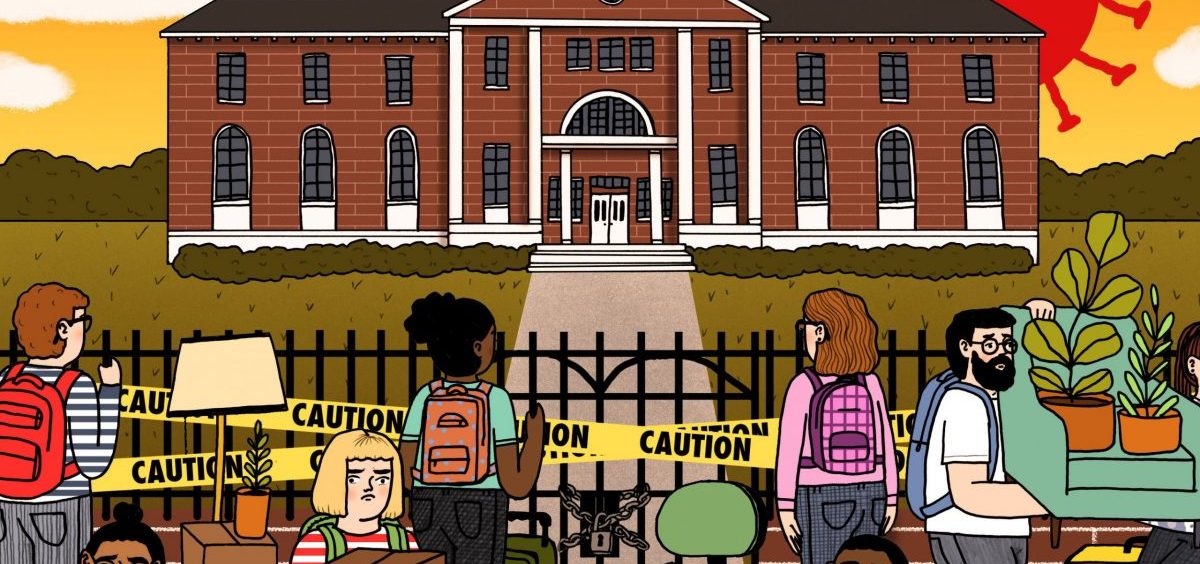News

When Colleges Shut Down, Some Students Have Nowhere To Go
By: Anya Kamenetz | NPR
Posted on:
Lee Myers is a senior at Berea College in Kentucky. Up until March 14, he was living in a dorm called Deep Green, majoring in philosophy with a minor in economics, and looking forward to a future career in social justice. Now that the campus has closed and graduation is canceled due to coronavirus, he and his classmates have bigger things to worry about.
“Some people are panicking, rightly so,” he says, “because they don’t know what they’re going to do. It’s sort of like a bombshell that dropped on campus.”
Every day, more colleges and universities are canceling in-person classes due to the threat. Most are keeping dorms and dining halls open for now, but a growing number have asked students to pack up and leave campus indefinitely. That presents a problem for the significant fraction of students who depend on their school for basic needs — food, housing, financial aid, health insurance and on-campus jobs. And, as colleges shift to online learning for the remainder of the semester, not everyone can afford the necessary laptops and broadband.
The Hope Center for College, Community and Justice at Temple University does an annual survey of college students, which found in 2019 that around half of all two-year students and almost one-third of four-year college students experienced housing insecurity, food insecurity or both. (The voluntary survey includes disproportionately few private colleges).
Around 700 colleges have established food pantries in the past several years, including Georgetown, University of California, Berkeley, and the University of Washington, according to the College and University Food Bank Alliance. .
Sara Goldrick-Rab, founder of the Hope Center, says now is the time for colleges to really step up.
“When you’re trying to help a group of people, especially during a crisis, it’s really important to center the most vulnerable people.”
Her organization has started an emergency fund, and released guidance for institutions, covering not only what colleges should be telling their students, but how they should be communicating it. “The biggest problem right now is that students are stressed and scared.”
At Berea College, Lee Myers agrees: “A lot of students are really not sure whether they can actually get the housing or stay on campus. And many of them are facing the prospect of homelessness or like living with a friend for a little bit.”
Berea is what’s called a “work college.” Nearly all students come from households where the income makes them eligible for Pell Grants. Students pay no tuition, work at jobs on campus for small cash stipends, and graduate without debt.
Myers, who comes from White House, Tenn., also depends on the school for his health insurance — he’s thinking of applying for Medicaid.
Tim Jordan, a spokesman for Berea College, said the school is offering financial assistance to help students with traveling home. Myers asked the college for gas money.
NPR contacted 86 of the hundreds of colleges that have closed so far. Most told us they’re still deciding exactly what they’re going to do.
“Students currently are meeting with Student Life representatives who are talking with them about whether or not they have a place to live and if they need to stay on campus for the duration,” said Vige Barrie, a spokeswoman for Hamilton College in Clinton, N.Y. “We anticipate that there will be students – those who are homeless, who are from other countries and fear they may not be able to get back to Hamilton, etc., who will be allowed to stay on campus.”
Barrie says the college will offer food service for all who stay on campus, and for those lacking laptops or wifi, “we are giving them the necessary equipment.” In addition, he added, “for those who can’t afford it, we are buying them tickets to fly home plus transport to the airport.”
Mark Alesia, a spokesman for Indiana State University in Terre Haute, told NPR that during spring break, some students will remain in residence halls. “They will have limited on-campus options for food, although that would have been the case regardless of COVID-19.”
As official responses vary, some students and alumni are stepping up to help their classmates and build community. At Tufts University in Massachusetts, and the University of Virginia, mutual aid Facebook pages have been set up, so students and community members can help each other with money, housing, frequent flyer miles or anything else they need.
Isabella Liu, a 19 year old student council member at UVA, runs her school’s page, which is called Hoos helping Hoos. She told NPR that in the first 48 hours, they raised $3,700 of aid and fielded $4,500 worth of requests.
“There are cases of students saying they cannot go home due to extenuating familial circumstances — unhealthy, toxic or even abusive environments,” Liu says. She’s back at her dad’s in Atlanta for now, but says she’s planning to return to campus in Charlottesville for a few days to help restock the food pantry. “We are hoping to come in and fill in those gaps and support students.”
9(MDI4ODU1ODA1MDE0ODA3MTMyMDY2MTJiNQ000))

